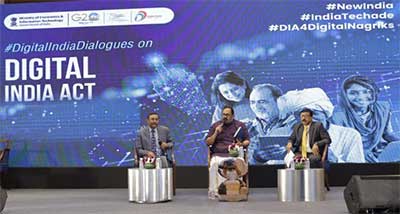Date: 13/03/2023
Relevance: GS-2: Government policies and interventions for development in various sectors and issues arising out of their design and implementation: Role of civil services in a democracy.
Key Phrases: Digital India Bill, Information Technology Act, 2000, Artificial Intelligence, Blockchain, Doxxing, Metaverse, Advanced Quantum Computing, Cognitive Biases, Civil Society, Right To Information, Media Ethics Code.
Context:
- Recently, a consultation was held in Bengaluru regarding the proposed 'Digital India Bill'. The bill is intended to replace the Information Technology Act of 2000, which is now over 20 years old.
Key Highlights:
- The current regulatory framework for entities on the internet is
the Information Technology Act of 2000.
- However, the law needs an update since it was framed for an Internet era that looked very different from the Internet of today.
- Consequently, the government has faced difficulties in implementing regulations as the parent act's scope is limited.
- In response to these challenges, the proposed Digital India Bill
aims to update the regulatory framework for the internet.
- The bill's core objectives include promoting an open and safe internet that protects user rights and reduces online risks, as well as accelerating the growth of technology innovation.
- The Bill is a key pillar of an overarching framework of technology regulations the Centre is building, including the draft Digital Personal Data Protection Bill, 2022; Indian Telecommunication Bill, 2022; and a policy for non-personal data governance.
Complexity of the Task:
- The task of regulating internet services is incredibly complex, with far-reaching impacts on areas such as competition, privacy, public discourse, and mental health.
- These issues encompass a range of problems, including market and
governance failures, as well as deep-seated social issues that are further
amplified by our cognitive biases.
- The effects of these issues flow seamlessly between physical and digital spaces and require a thorough understanding before they can be effectively addressed through legislative interventions.
- It is important to recognize that attempting to solve several problems with one policy is not a viable approach, as it can lead to a trade-off between equity, efficiency, and effectiveness.
Clarity Is Important:
- Despite being informed about the proposed legislation for almost a year, there hasn't been a clear and comprehensive articulation of what the Ministry of Information and Technology (MeitY) considers to be the key safety issues and harms faced on the internet.
- Moreover, none of the departments within the executive has detailed how the current laws are applicable to the internet, the gaps that exist, and whether they are due to framing, enforcement, etc.
- Fixing accountability on intermediaries without outlining the
existing problems and supporting them with evidence cannot be the sole aim.
- Additionally, while designing policies involves confronting trade-offs, there needs to be due consideration and explanation of the benefits that internet services enable, an assessment of how they may be impacted, and the thought process behind the choices made.
- These prerequisites are essential for civil society, industry, and the government itself to determine whether they are on the right track or engaging in an exercise of putting the cart before the horse.
The Past Record:
- MeitY’s track record suggests there is room for improvement,
which is demonstrated by a few notable examples.
- Civil society has criticized previous draft versions of proposed data legislation for several years, particularly regarding exemptions for the state and the perceived lack of independence of a data protection authority.
-
The recent draft has not only seemingly ignored this feedback but also made it worse in some circumstances
- Further, the Ministry has denied Right to Information requests for
consultation responses to the draft Indian Telecommunications Bill, 2022.
- It went a step further with the draft Digital Personal Data Protection Bill, 2022 and subsequent consultations by stating upfront that consultation responses would not be made public.
- Moreover, it has declined to disclose information about
consultation responses for amendments to the IT (Intermediary Guidelines and
Digital Media Ethics Code) Rules, 2021 concerning online gaming, citing
procedural technicalities.
- The Ministry's lack of transparency, cloaked under procedural technicalities, contradicts any claims of a genuinely transparent process.
Way Forward:
- To establish itself as a leader in all things digital in the long term, the Government of India should encourage the development of institutional capability and independent research.
- Some of these gaps can be narrowed in the near term by conducting
genuine public consultations in good faith.
- An open, trusted, and accountable process, where the executive is open to feedback and course correction, should form the basis of such ambitious legislation.
- Any legislation that emerges from consultation processes that are not genuinely open, transparent, and conducted in good faith will likely be deficient in substance and adversely affect the digital and physical safety of citizens.
Source: The Indian Express
Mains Question:
Q. What are the key elements required for the Digital India Bill to be effective in promoting the digital and physical safety of citizens, and what risks are associated with a lack of focus, openness, and good-faith consultation during the legislative process? Comment (250 words).







